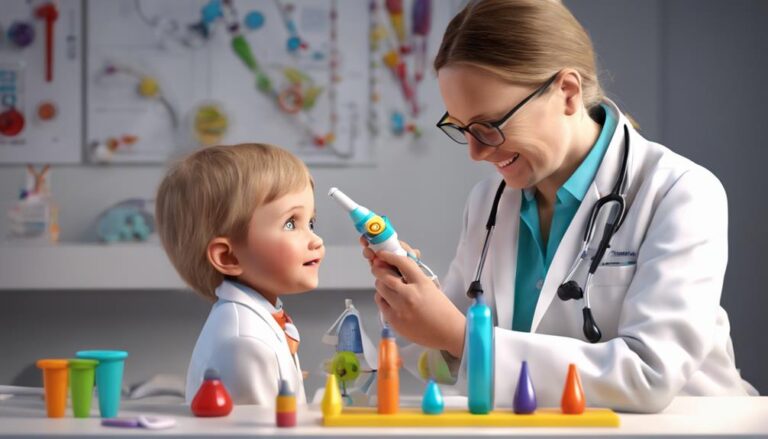Plastic Surgeon Job Description
As a plastic surgeon, you would perform cosmetic surgeries like breast augmentations, rhinoplasties, and facelifts, prioritizing patient safety. You would provide emotional support, guarantee informed decisions, and monitor post-op care. Effective communication is vital to manage expectations and deliver desired outcomes. To become a plastic surgeon, complete medical school, residency, and obtain board certification. Continuous learning is essential for staying updated. A positive job outlook and high salary in the US make this profession attractive. The transformative impact on patients' lives and diverse work environments add to the appeal. Explore the detailed tasks and skills involved in this rewarding profession.
Key Takeaways
- Perform cosmetic surgeries like breast augmentations, rhinoplasties, liposuctions, and facelifts with precision.
- Prioritize patient safety during surgical procedures to ensure optimal outcomes.
- Provide emotional support, guidance, and ensure realistic patient expectations.
- Monitor post-operative care, address complications, and prioritize patient well-being.
- Stay updated on advancements in plastic surgery through continuous education and training.
Roles and Responsibilities
As a plastic surgeon, your roles and responsibilities encompass a wide range of surgical and non-surgical tasks related to enhancing, reconstructing, or altering a patient's physical appearance. When it comes to surgical procedures, you're tasked with performing various cosmetic surgeries such as breast augmentations, rhinoplasties, liposuctions, and facelifts. These procedures require precision, skill, and a keen eye for aesthetics to achieve the desired results while prioritizing patient safety.
Patient care is a fundamental aspect of your role as a plastic surgeon. You mustn't only assess the physical aspects of a patient's condition but also provide emotional support and guidance throughout their surgical journey. It's important to communicate effectively with patients, ensuring they've realistic expectations and are well-informed about the procedures they're undergoing. Additionally, post-operative care plays a significant role in monitoring patients' recovery progress and addressing any concerns or complications that may arise. Your responsibilities extend beyond the operating room to nurturing a trusting and supportive relationship with your patients to ensure their well-being and satisfaction.
Required Skills and Abilities
Demonstrate proficiency in a diverse range of surgical techniques and aesthetic principles when considering the required skills and abilities for a plastic surgeon. As a plastic surgeon, you must possess excellent patient communication skills to understand their needs and expectations clearly. Additionally, mastering various surgical techniques is essential to perform procedures with precision and achieve excellent results for your patients.
—
| Required Skills and Abilities | Description | Importance |
|---|---|---|
| Patient Communication | Ability to effectively communicate with patients to understand their desires and provide realistic expectations. | Critical for establishing trust and ensuring patient satisfaction. |
| Surgical Techniques | Proficiency in a wide array of surgical procedures to address different cosmetic or reconstructive needs. | Key for performing surgeries with precision and achieving desired outcomes. |
—
Education and Training
To pursue a career as a plastic surgeon, obtaining the necessary education and training is vital. After completing medical school, aspiring plastic surgeons must undergo rigorous residency programs specializing in plastic and reconstructive surgery. These programs typically last around 6-7 years and provide hands-on experience in various surgical procedures under the guidance of experienced surgeons.
Board certification is another essential step in the educational journey of a plastic surgeon. This certification guarantees that the surgeon has met specific requirements set by the American Board of Plastic Surgery, demonstrating a high level of expertise and competency in the field.
Additionally, continuous learning through workshops, conferences, and staying updated on the latest advancements in plastic surgery techniques is crucial to maintain proficiency and deliver the best possible care to patients.
- Residency programs offer intensive training and exposure to diverse cases.
- Board certification signifies proficiency and dedication to the specialty.
- Continuous education ensures staying abreast of the latest advancements in plastic surgery.
Certifications and Licenses
Obtaining the necessary certifications and licenses is a critical step in establishing your credibility and guaranteeing compliance as a plastic surgeon. To become a board-certified plastic surgeon, you must complete an accredited plastic surgery residency program and pass the certification requirements set by the American Board of Plastic Surgery (ABPS). The certification process includes written and oral exams to assess your knowledge, skills, and competency in plastic surgery.
Additionally, you'll need to obtain a state medical license to practice as a plastic surgeon. The licensing process involves completing medical school, passing the United States Medical Licensing Examination (USMLE), and meeting the specific licensing requirements of the state where you plan to practice. It's essential to stay informed about any updates or changes in the licensing regulations to guarantee you're in compliance with the state's laws and regulations.
Job Outlook and Salary
Ensuring a thorough understanding of the job outlook and salary for plastic surgeons is essential for those considering a career in this field. Plastic surgeons generally experience a positive job outlook due to the increasing demand for cosmetic and reconstructive procedures. The median annual salary for plastic surgeons in the United States is around $400,000, making it one of the highest-paying medical specialties.
- Job satisfaction among plastic surgeons is often high, as they can witness the transformative impact of their work on patients' lives.
- The workplace environment for plastic surgeons can vary, ranging from private practices to hospitals, academia, or even international medical missions, offering diverse settings to practice in.
- Plastic surgeons who specialize in specific areas such as hand surgery or craniofacial surgery may find even greater job satisfaction due to the unique challenges and rewards these subspecialties offer.
Understanding the job outlook and salary can help aspiring plastic surgeons make informed decisions about their future career paths.
Frequently Asked Questions
Is Prior Experience in Cosmetic Surgery Necessary?
Prior experience in cosmetic surgery is not a strict requirement for aspiring plastic surgeons. However, gaining training in cosmetic procedures is beneficial due to industry demand. Training requirements may vary, but hands-on experience can enhance skill and competitiveness.
How Often Do Plastic Surgeons Work on Call?
Balancing work and personal life is essential. Plastic surgeons often have on-call duties to handle emergencies. Managing call schedules effectively can help prevent burnout. It's important to find a healthy balance for a fulfilling career.
Do Plastic Surgeons Specialize in Specific Procedures?
Yes, plastic surgeons specialize in specific procedures after completing their training. There are various training opportunities available for plastic surgeons to enhance their skills and focus on particular areas like cosmetic surgery or reconstructive procedures.
What Advancements Are Shaping the Future of Plastic Surgery?
Advancements like AI in surgery and 3D printing are shaping plastic surgery's future. AI aids in precise procedures, while 3D printing creates customized implants. This innovative tech revolutionizes patient care, ensuring safer, more tailored outcomes.
Are There Opportunities for Plastic Surgeons to Conduct Research?
Yes, there are ample research opportunities for plastic surgeons, fostering academic collaborations. Engaging in research allows you to contribute to the field's advancement, driving innovation, and enhancing patient care through evidence-based practices.
Conclusion
As a plastic surgeon, you're the sculptor of confidence, reshaping bodies and restoring self-esteem. Your hands are the tools that carve out beauty from imperfections, giving hope to those seeking transformation.
With precision and skill, you bring dreams to life, creating masterpieces that stand the test of time. Your dedication to perfection and passion for enhancing lives make you a true artist in the world of medicine.







